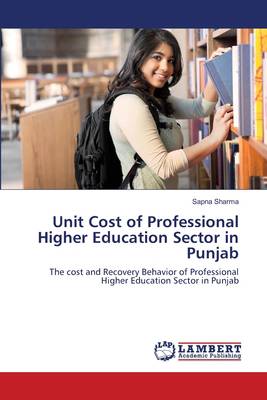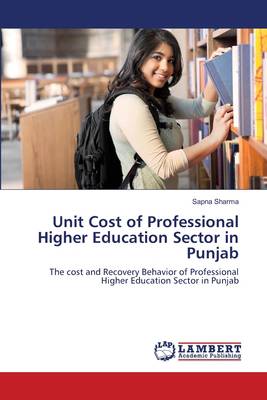
- Afhalen na 1 uur in een winkel met voorraad
- Gratis thuislevering in België vanaf € 30
- Ruim aanbod met 7 miljoen producten
- Afhalen na 1 uur in een winkel met voorraad
- Gratis thuislevering in België vanaf € 30
- Ruim aanbod met 7 miljoen producten
Zoeken
Unit Cost of Professional Higher Education Sector in Punjab
The cost and Recovery Behavior of Professional Higher Education Sector in Punjab
Sapna Sharma
Paperback | Engels
€ 48,45
+ 96 punten
Omschrijving
The Study primarily deals with the estimation of cost and recovery behavior of professional education in Punjab. From the study, it becomes clear that the practices related to fees and funds, recovery of costs, salary of the staff demand serious attention of the state. The level of fees and funds are very high in different trades/courses in the professional higher education. The private institutes providing professional higher education have been found to be generating huge economic surpluses, i.e. receipts were found to be much more than that of costs. The state has to decide about the extent and modes of cost recovery. The allowing of full recovery of institutional costs would be socially hazardous step, and ultimately, it will turn out to be a phenomenon not conducive to the economic growth of state. It is also held that as is the practice in advanced countries, the recoveries from the students should not be more than 20-25 per cent of the recurring cost from the students. The institutions/governments should bear 75-80 per cent of the recurring cost.
Specificaties
Betrokkenen
- Auteur(s):
- Uitgeverij:
Inhoud
- Aantal bladzijden:
- 112
- Taal:
- Engels
Eigenschappen
- Productcode (EAN):
- 9783659180774
- Verschijningsdatum:
- 13/07/2012
- Uitvoering:
- Paperback
- Formaat:
- Trade paperback (VS)
- Afmetingen:
- 152 mm x 229 mm
- Gewicht:
- 176 g

Alleen bij Standaard Boekhandel
+ 96 punten op je klantenkaart van Standaard Boekhandel
Beoordelingen
We publiceren alleen reviews die voldoen aan de voorwaarden voor reviews. Bekijk onze voorwaarden voor reviews.











